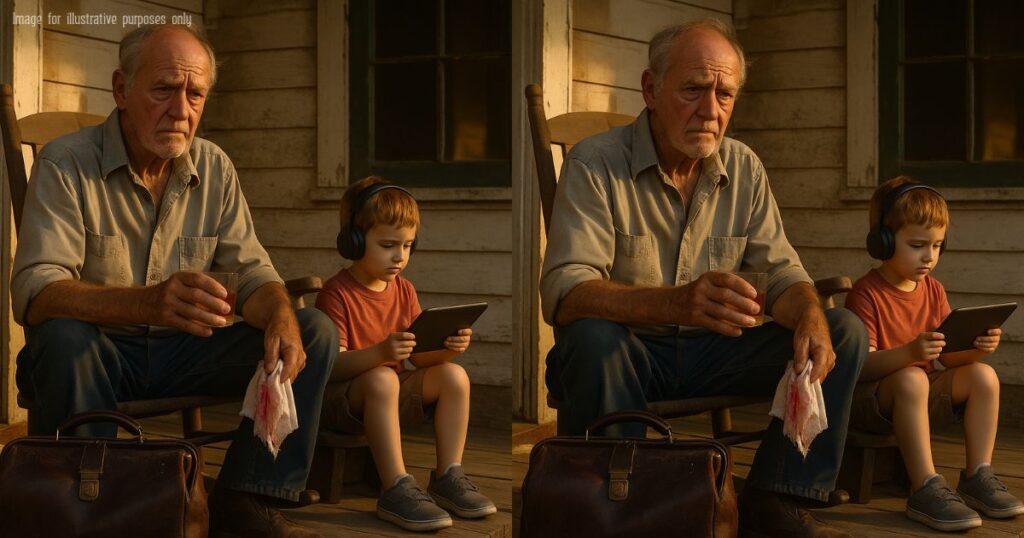Eli looks at the bundle on his lap like it might be alive.
“It’s heavy,” he says.
I nod. “It should be.”
He fumbles with the knot, then pulls back the cloth. Inside is my old black medical bag. Leather worn thin in places, one brass latch missing, but still strong. It smells like iodine and saddle soap—like time itself.
“Is this yours?” he asks.
“It was,” I say, running my fingers along the seam. “From the day I got my license to the day I retired. Fifty years.”
He opens it slowly. Inside, everything rests as I left it. The blood pressure cuff with the cracked rubber bulb. The old stethoscope with the tubing that used to be navy blue. Scissors dulled by decades. My first reflex hammer. A faded Polaroid of me and a baby I delivered in the back of a station wagon.
“Whoa,” Eli whispers. “Did you use these on people?”
“I did. Some of them are gone now. Some of them are still walking around this town, arguing with their grandkids just like I’m doing now.”
Eli chuckles. Then quiets.
He pulls out the stethoscope and holds it like a sacred object. “Can I try?”
I help him place the earpieces in, press the bell to his chest. His eyes widen.
“I can hear my heart!”
“That’s you,” I say. “All yours. Don’t ever forget that sound.”
We sit like that for a while. Me watching him discover pieces of the life I used to live. Him trying to imagine what it was like when people knocked on my door at two in the morning, holding babies with fevers or bleeding hands. When I had to be a doctor, a priest, and a neighbor all at once.
He lifts the scissors. “What’s this for?”
“Cutting away lies,” I say with a wink. “And bandages, mostly.”
He grins. “You’re funny.”
“Only sometimes.”
Then he grows serious. “Did you ever save someone who didn’t want to be saved?”
I look at him, surprised by the question. It’s one I haven’t asked myself in years.
“Yes,” I say finally. “Once.”
He waits.
“Back in ’93. A man came in with chest pain. Wouldn’t let me check him. Said he’d rather die than owe another bill. I treated him anyway. Got him stable. He was angry, but alive. A week later he brought me a peach cobbler and a thank-you note.”
“What did the note say?”
I smile. “Said, ‘You were right to ignore me. I needed saving more than I knew.’”
The porch light flickers on. Mosquitoes begin their nightly hunt. I swat one from Eli’s arm and think about the way the world has changed. About how once we trusted people more than screens. How we knocked on neighbors’ doors instead of sending texts that got ignored. How we fixed things when they broke—instead of throwing them away.
“Grandpa,” Eli says, “do you think I could be a doctor one day?”
I pause.
Not because I doubt him. Not because I don’t want it.
But because I don’t know what kind of world he’ll grow into.
Being a doctor used to mean presence. Hands. Smell. Sweat. It meant knowing your patients, not just their numbers on a screen. These days, it’s managed care, click boxes, fifteen-minute slots, lawsuits, AI diagnoses, and protocols that override instincts.
But I look at him.
His earnest eyes. His steady fingers. His need to understand, not just to win.
“Yes,” I say, and I mean it. “But promise me something.”
“What?”
“Don’t become the kind of doctor who forgets what a human heartbeat means.”
He nods solemnly.
“Promise me you’ll listen longer than you talk. Touch when it helps. Show up, even if you don’t have all the answers.”
“I promise,” he says, and I believe him.


